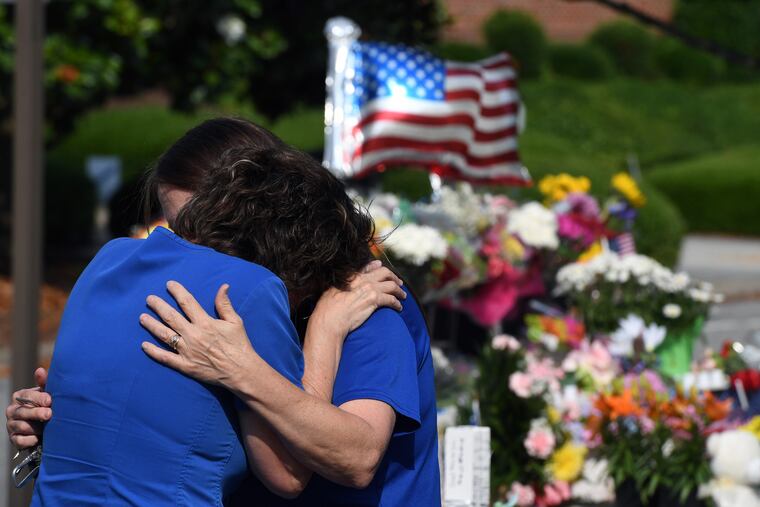Eliminating gun-free zones: A way to deter mass shooters? | Opinion
Anyone concerned with eliminating — or at least substantially reducing — mass public shootings must ask whether or not gun-free zones pose a danger to the public by attracting killers who prefer an unarmed victim pool.

Almost before the smoke had cleared from last week’s mass shooting in Virginia Beach, demands were being made for more restrictions on the purchase and possession of firearms. But what further restrictions would have prevented this latest massacre? And, more to the point, what practical steps can be taken to prevent another such occurrence?
The shooter used two handguns which he purchased legally in 2016 and 2018. This means that with each purchase he had to pass a federally mandated background check. One of the guns was fitted with a suppressor, a device that reduces the noise of a firearm discharge from ear-splittingly painful to merely loud. To purchase and possess a suppressor, one must go through a detailed, expensive, burdensome, and lengthy (averaging 10 months) vetting process by the ATF.
So far no specific changes to the state and federal restrictions on firearm ownership have been proposed. But realistically, what other changes could be made that would be effective? The shooter had no criminal record or history of mental disorder. He was employed by the City of Virginia Beach in good standing and, according to media reports, interacted peaceably and appropriately with his coworkers. Apparently nobody had any hint that the shooter was a threat.
While outright confiscation of all privately owned firearms may appeal to some as a possible remedy, how likely is it that it could be made law given that there are over 90 million legal owners of firearms who form the largest single-issue voting bloc in America? And, even assuming confiscation became law, if only a small minority of those legal gun owners refused to comply, how many millions of firearms would simply go off the books and remain in private hands? And what kind of civil disorder and carnage might result if even a tiny fraction of those 90 million gun owners actively resisted confiscation?
Moreover, there are already untold millions of unregistered firearms in the hands of criminals. Would they willingly surrender their guns? Or would the attempted confiscation of all firearms legal or otherwise merely produce an unworkable and unenforceable societal and law enforcement nightmare similar to that spawned by the equally utopian experiment of Prohibition?
A modest proposal
So what can be done in the here and now to prevent another massacre? I have a modest proposal. How about outlawing and eliminating so-called “gun-free zones.”
The Virginia Beach shooting took place in the city government’s Operations Building. Virginia Beach prohibits its employees from carrying firearms. This means that the shooter knew that his coworkers at the location would have no effective means of countering his intended use of deadly force. In that regard, this massacre followed the modus operandi of mass shooters.
According to the Crime Prevention and Research Center, between 1950 and 2018, 97.8 percent of all mass public shootings occurred in gun-free zones. Similarly, in the 20 states that allow teachers to be armed, there have been no school shootings (as well as no accidents or injuries caused by firearms possessed by teachers).
There is also anecdotal proof that mass-casualty shooters prefer gun-free zones. For example, in 2016, Dearborn Heights, Mich., ISIS supporter Khalil Abu-Rayyan had an online discussion with an undercover FBI agent in which he discussed his plan for a “martyrdom operation” by attacking a Detroit church. He told the agent that this would be an easy target because “people are not allowed to carry guns in church."
Similarly, in 2015, Elliot Ridge murdered six people in a Santa Barbara, Calif., gun-free zone. In his 141-page “manifesto,” he explained that in planning his attack he had decided against launching it in other locations where someone with a gun might be present to cut short his killing spree.
In the 2012 Aurora, Colo., theater massacre, the killer’s diary showed that he had decided against attacking an airport because of its “substantial security." And, of the seven movie theaters within 20 minutes of the shooter’s home, he chose the only one that had posted signs declaring it to be a gun-free zone.
Worth a try
Given this record, anyone concerned with eliminating — or at least substantially reducing — mass public shootings must ask whether or not gun-free zones pose a danger to the public by attracting killers who prefer an unarmed victim pool and should give serious consideration to the following propositions:
First, however well-intended, gun-free zones do not work. While they might provide symbolic or emotional comfort to those who fear firearms, they have no real-world practical effect other than to encourage law-abiding armed citizens to stay away.
Mass-casualty shooters have overwhelmingly elected to carry out their attacks in gun-free zones.
Relative to all of the other proposed solutions to the problem of mass public shootings, the elimination of gun-free zones would be comparatively simple and inexpensive.
Eliminating the demonstrably ineffective gun-free zones would cause no permanent or substantial damage or loss to owners of such properties.
The elimination of gun-free zones may not prove to be the definitive answer, but the evidence indicates that it should be tried. Otherwise we will continue to attempt the same old failed solutions over and over again while expecting a different result.
But to continue doing that is the very definition of insanity.
George Parry is a former federal and state prosecutor. He is a regular contributor to the American Spectator and blogs at knowledgeisgood.net. kignet1@gmail.com.